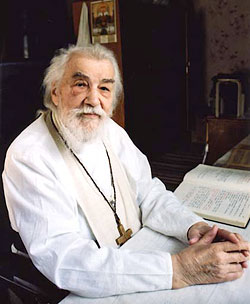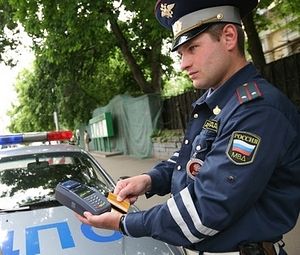One day, an important young man—a graduate of the theological academy—walked up to Fr. John (Krestiankin), and introduced himself. "I am a theologian!" he added.
Fr. John was quite amazed, and asked him, "How so? Are you the fourth?"
"What 'fourth'?" the graduate said, not understanding what Fr. John meant.
 |
| Archmandrite John (Krestiankin) |
But anyway, how does the Lord send His spiritual wisdom, and to whom? In fact, one doesn't have to graduate from theological academy and wear a ryassa in order to be a theologian. The wind bloweth where it listeth (Jn. 3:8), as the Apostle Paul exclaimed in amazement.
Once, I was travelling with our Sretensky Monastery choir in the Far East, visiting the military base of strategic aviation. After the services and concert, the officers invited us to dinner. This Orthodox church service was the first one to take place in this far-away military town. It is understandable that the locals looked at us with interest, like something out of this world. As is customary for Orthodox Christians, we read the "Our Father" before the meal. The general, who enjoyed everyone's respect, prayed with us and crossed himself. Two hours later, toward the end of the dinner, the officers asked him:
"Comrade General! We saw how you crossed yourself. We respect you. But we don't understand you! Probably you have re-thought many things that we haven't even thought about yet. Tell us, what is the most important thing in life, as you have understood it over the years? What is life's meaning?"
Such questions are only asked after people have sat together at a hospitable table for a good long time, in the Russian style—when trustful, friendly feelings prevail.
Then the general—a real, army general—thought a bit, and said, "The most important thing in life is to preserve your heart pure before God!"
I was amazed! Only a true, outstanding theologian—in thought and practice—could put it so precisely and deeply. But I think that the army general had no idea about that.
In fact, some people seemingly far from theological sciences could teach our brothers, the priests, a few things, and even put them to shame.
During the discussion period before the reunification of the Russian Church Abroad with the Moscow Patriarchate, Archbishop Mark of Berlin and Germany (ROCOR) admitted to me that certain incidents he experienced in Russian got him thinking that the spiritual changes in our country were not propaganda, but reality.
Once, a priest was driving him in his car around the Moscow suburbs. Vladyka Mark is a German, and it was something out of the ordinary for him to observe that despite the signs along the highway designating a speed limit of ninety kilometers per hour, the automobile in which he was riding was hurling down the road at 140. Vladyka kept silence for a long time, but finally tactfully expressed his perplexity. The priest, however, only snickered at the naïve question of a foreigner.
"But what if we are stopped by the police?" Vladyka asked, surprised.
"The police are also okay!"[1] the priest confidently answered his astonished guest.
And to be sure, a little while later, they were stopped by the highway patrol. Rolling down the window, the priest amiably greeted the young police officer. "Good afternoon, officer! Forgive us, were in a hurry!"
The police officer, however, did not react to the greeting at all. "Your documents!" he requested dryly.
 |
"Your documents!" the officer repeated.
The priest was hurt and ashamed before his guest, but there was nothing left to do—he handed his driver's license and registration to the policeman, but could not refrain from making a biting remark:
"Alright, take it! Of course, it's your job to punish, but our job to have mercy!"
At this, the police officer cast him a cold stare, and uttered reservedly, "Well, first of all, we don't punish—the law does. And it's not you who has mercy, but the Lord God!"
At that moment, as Vladyka Mark said, he understood that if policemen on the Russian highways are now thinking in such categories, then something has changed yet again in this unfathomable country. But this time, apparently, not for the worse.

